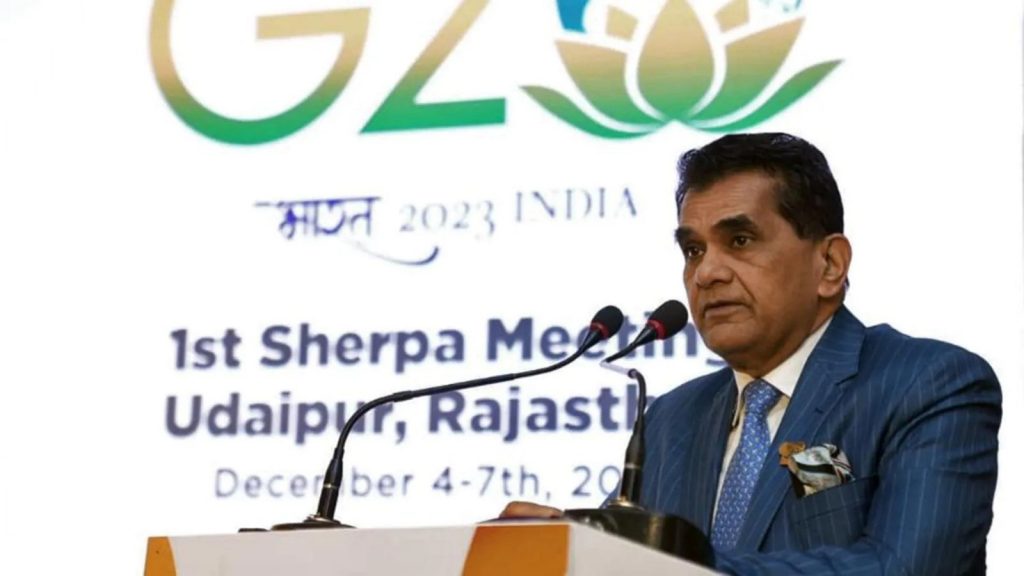In spite of several challenges facing the world today, India as G20 president sees opportunities in them, the G20 sherpa said.
Biofuels and green hydrogen are at the centre of India’s energy transition pathway, G20 Sherpa Amitabh Kant said at a Hindustan Times event on sustainable development goals and biofuels, part of a series of events HT is hosting on India’s G20 agenda.
In spite of several challenges facing the world today, India as G20 president sees opportunities in them, particularly on energy transition and climate action, he said.
“Energy is a critical element of G20. It has been figuring in G20 since 2009. Energy transition plays a critical role in achieving net zero goals. India’s G20 presidency is being hosted at a time when we are facing several challenges. The global economy is seeing a slowdown. One third of the world is in slow down phase. Germany got into a recession. Around 75 countries are facing global debt crisis. There is a challenge of achieving sustainable development goals (SDGs); only 12 are on track out of 17,” Kant said.
“We (India) are at a midway point. We have the huge challenge of climate action and climate finance. There is a war going on for a year and a half but we in India see these challenges during our G20 presidency as opportunities,” he added.
“As Prime Minister Narendra Modi has said, India’s presidency will be ambitious, decisive, inclusive and action oriented,” Kant said. “One of the key things we tried to make G20 action-oriented is energy transition. The key today is to transit from a fossil fuel-based economy to clean fuels and there are two major strands,” Kant said, explaining why biofuels and green hydrogen will be critical for energy transition.
“We import about $180 to $200 billion worth of fossil fuel, depending on the year, and he (Modi) has announced by 2047, instead of being an importer of fossil fuel, we will be an exporter of clean fuel to the world. That would mean we move towards renewable energy, but what about the hard to abate sectors like steel, refinery, cement, fertilizers? Steel needs coal. So, you need to move towards green hydrogen and, hence, the government has announced it in mission mode,” he said.
“The second strand is about biofuels. Instead of consuming diesel and petrol, you start mixing biofuels. These are mainly derived from biomass,” Kant said.
There are four generations of biofuels, he said. These include those produced using edible crops; feedstock and non-edibles like straw and forest residue, algae; and genetically modified algae.
Biofuels also provide alternative to crop stubble burning, Kant explained. The National Biofuel Policy was amended in June 2022, he said. The objective of the policy was to reduce import of petroleum products.
“We have already achieved ethanol blending of 10% in June 2022. We will achieve 20% in advance before 2025-26,” he said. “It will be a massive boost to farmers and prevent burning of agriculture waste and manage organic waste.”
Uttar Pradesh and Tamil Nadu have released their biofuel policies, he informed. Biofuel investments to the tune of ₹7,000 to ₹75,000 crore are being made in these two states.
“Biofuels play a critical role in achieving SDG 7 (ensure access to affordable, reliable, sustainable and modern energy for all), which is critical in circular economy, and SDG 13 (urgent action on climate change),” Kant said.
“Biofuels can cut greenhouse gas emissions by up to 46% compared to fossil fuels. There is huge political and administrative will. We are in the process of transitioning to low carbon future,” he said. “There will be challenges of transportation, future market demand, etc. But, there is assured purchase from oil companies.”
Tags: Biofuels, G20, Green Hydrogen, Low Carbon, Sustainability



Recent Posts
PIL Conducts First Simultaneous Cargo and LNG Bunkering in Singapore
NYK Takes Delivery of LNG-Fuelled Capesize Bulker SG Dawn
Swire Shipping joins Achilles Maritime Network to strengthen supply chain sustainability and compliance
L&T Open to Minority Stake Sale in Green Hydrogen and Ammonia Projects
Government Briefs Parliament on Oil, Gas, and Alternative Fuel Projects
Angola’s NVS Targets Green Methanol Production for Multiple Sectors
CBH Group Trials Biofuels to Cut Maritime Emissions in Grain Exports to Europe
Grimaldi Group Takes Delivery of Ammonia-Ready PCTC Grande Tianjin